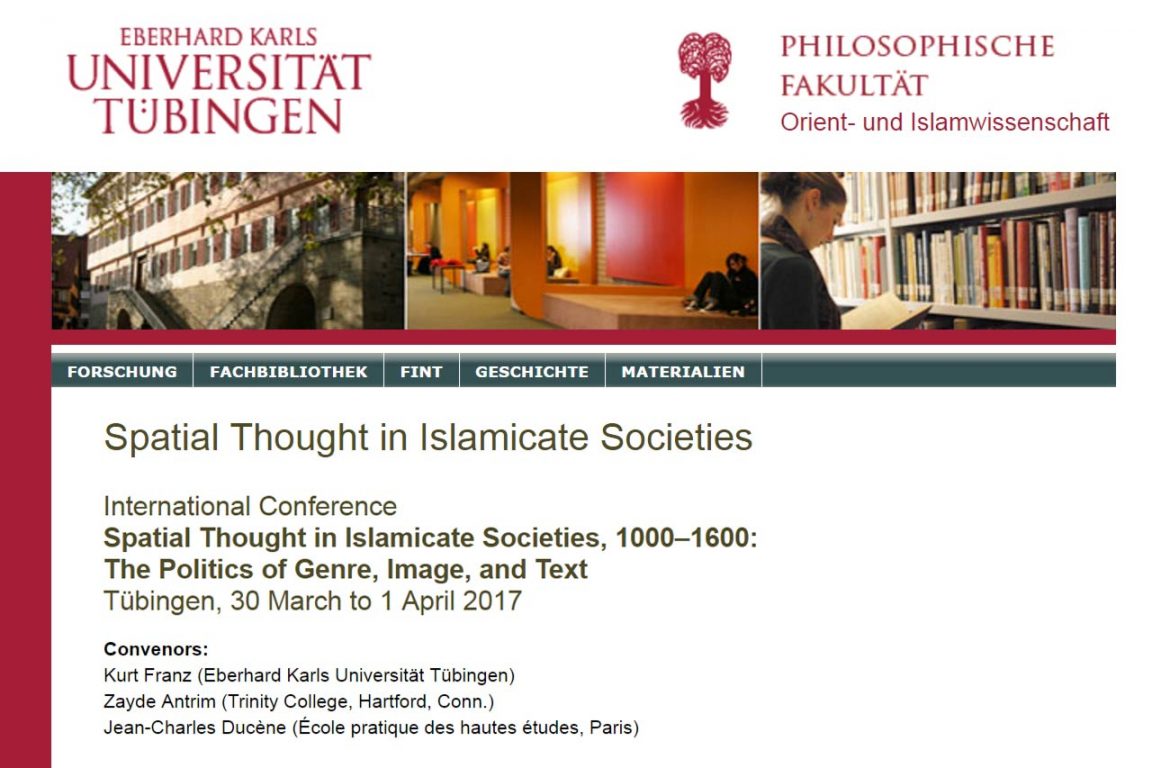Spatial Thought in Islamicate Societies

About The Event
Spatial Thought in Islamicate Societies, 1000–1600: The Politics of Genre, Image, and Text
Call for Papers
Date: 30 March – 1 April 2017
Venue: Tübingen, Germany
Submission Deadline: June 30, 2016
Recent years have seen new approaches to the history of geography and cartography, as well as spatial thought more broadly, in the Islamicate world. Place and space are now increasingly understood as invented reference systems that are entangled with political, religious, cultural, and intellectual history. Thus contextualized, geographic knowledge proves to be more dynamic and varied than previously thought, and many more genres of literature can be seen as relevant to its study. These include world and regional geographies, urban topographies, pilgrimage guides, administrative manuals, travelogues, religious or astronomical treatises, encyclopedias, legal documents, and belletristic compendia, many of which are accompanied by images or maps.
At the same time, questions arise about the importance of geographical knowledge to historical actors and the ways in which spatial considerations affected state policies, as well as quotidian religious or economic activities undertaken by, for instance, political and military leaders, merchants and travelers, or itinerant Sufis and pilgrims. Moreover, opportunities to analyze centuries-old geographic and cartographic texts have been enhanced by new technologies such as electronic data processing, the unprecedented availability of geodata, and the tools of digital cartography.
Taken together, it seems that what was previously understood narrowly as the history of geography or cartography is shifting to a more diversely linked spatial history, with new relevance for the study of Islamicate societies.
The aim of this conference is to explore these developments further, with special emphasis on the following four interrelated categories:
GENRE: Is genre a useful concept for understanding spatial thought in this period? For instance, do works of geography have anything in common with urban topographies or religious treatises? Can we meaningfully speak of the development of an intellectual field with specific methods or standards for criticism? How do images and maps relate to questions of genre? How did literary traditions combine with formal and thematic innovation? What role did geography play in encyclopedic literature?
AUTHORSHIP: Who composed spatially-oriented texts and from which intellectual or professional backgrounds? What motivated them to do so? How can we discern and describe boundaries or transitions between collectively transmitted knowledge and individual contributions? Was there a direct relationship between the “state” and the composition of such texts? In what times and places did they proliferate? Who designed or drew maps? Is there any indication that authors thought of themselves as a group?
THEME: How do we understand space and place through texts? Can we detect thematic patterns across genres? How do conceptions and descriptions in the texts respond to each other? What is the relationship between a written text and its accompanying images or maps? What is the relationship between the materiality of a place and its representation in a text? What is the relationship between travel and text? To what degree do thematic patterns correspond with social and political change?
RECEPTION: Who was the audience for spatially-oriented texts and images? Where, by whom, and for whom were they copied over the centuries? How were they transformed in their copying? Can we reconstruct reception histories for these texts or detect the uses to which they were put? Did spatially-oriented texts and images matter?
Eligible candidates are requested to submit a statement of intent along with a project description of at most 1000 words, a CV, and a letter of recommendation to spatial-thought@aoi.uni-tuebingen.de. Please submit these no later than 15 December 2016. We also ask that all recipients of this call look out for eligible candidates.
Convenors:
– Kurt Franz (University of Tübingen)
– Zayde Antrim (Trinity College, Hartford, Connecticut)
– Jean-Charles Ducène (École pratique des hautes études, Paris)
Contact: spatial-thought@aoi.uni-tuebingen.de
More information at: www.spatial-thought.uni-tuebingen.de
Location
Tübingen, Germany


We're always eager to hear from you.
If you’d like to learn more about us or have a general comments and suggestions about the site, email us at